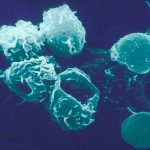Link to Pubmed [PMID] – 2150759
Int. Immunol. 1990;2(6):487-94
The influence of T cell help on the induction, maintenance, and recall of B cell memory to a T cell-dependent antigen was studied in mice. The antigen was a hapten coupled to a protein carrier, and helper T cells were eliminated before, during, or after immunization by treatment of the animals with anti-CD4 antibodies. B cell memory was quantified in an adoptive cell transfer system, transferring B cells from the primed animals together with carrier-primed syngeneic T cells. Anti-CD4 treatment completely inhibited the induction of primary and secondary responses and of B cell memory. In contrast, it did not affect established B cell memory over a period of at least 6 weeks. Consequently, this suggests that within this time range B cell memory to a T cell-dependent antigen does not rely on the continuous recruitment of naive B cells into the memory compartment, and memory B cells need little or no (antigen-mediated) T cell help in order to persist.

